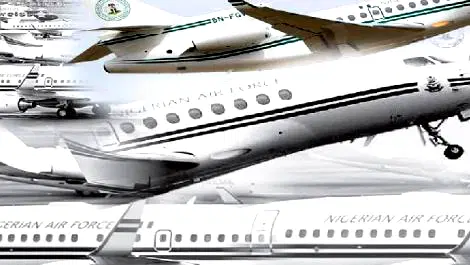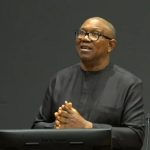Is the Seizure of Nigerian Presidential Jets a Legal Dispute or a Hostile Conspiracy?
The seizure of three Nigerian presidential jets in France and Switzerland by a Chinese company has ignited a heated debate in Nigeria.
The jets, valued at over $100 million, were taken under a court order secured by Zhongshan Fucheng Industrial Investment Co. Limited, which is involved in a legal dispute with the Ogun State government over a terminated contract.
Join our WhatsApp ChannelWhile the legal battle is rooted in a commercial disagreement, the Nigerian government alleges a more sinister agenda, raising questions about whether this is merely a legal dispute or a calculated hostile conspiracy against the country.
The Legal Dispute: A Timeline of Events
The conflict began in 2010 when Zhongshan’s parent company, Zhuhai Zhongfu Industrial Group, obtained rights to develop the Ogun Guangdong Free Trade Zone (OGFTZ) in Ogun State, Nigeria.
This agreement was part of a broader bilateral investment treaty between Nigeria and China aimed at boosting economic cooperation.
In 2013, a joint venture agreement made Zhongfu, a subsidiary of Zhongshan, the permanent manager of the free trade zone.
However, the relationship soured in 2016 when the Ogun State government abruptly terminated Zhongfu’s appointment, citing unsatisfactory performance and unmet obligations. Zhongshan, alleging a breach of the investment treaty, initiated arbitration proceedings against Nigeria.
In 2021, the arbitration tribunal ruled in favour of Zhongshan, awarding the company $74.5 million in damages, plus interest and legal costs, bringing the total to approximately $70 million.
Efforts by the Nigerian government to resolve the dispute amicably proved unsuccessful, and Zhongshan sought to enforce the award through the seizure of Nigerian assets abroad, culminating in the recent confiscation of the presidential jets.
READ ALSO: Buying New Jets Amid High Debt, Poverty, Not Acceptable, Obi Tells Tinubu’s Govt
Nigeria’s Response: Allegations of Hostile Conspiracy
While the seizure of the jets can be viewed as a straightforward legal enforcement of an arbitration award, the Nigerian government sees it differently.
Officials have accused Zhongshan of engaging in a hostile conspiracy to undermine Nigeria’s sovereignty and destabilise its government.
“This is not just about money; this is about an orchestrated effort to weaken Nigeria’s standing in the international community,” said Bayo Onanuga, the Special Adviser to the President on Information and Strategy.
“The seizure of our presidential jets is a deliberate act of aggression designed to embarrass Nigeria and create chaos.”
Onanuga further suggested that Zhongshan’s actions could be part of a broader strategy by foreign interests to exploit Nigeria’s legal vulnerabilities and exert undue pressure on the country.
“We have seen this before with the P&ID case, where foreign entities, under the guise of legal disputes, attempt to defraud Nigeria and compromise our national security. We must ask ourselves: is this truly a legal matter, or is there a larger plot at play?”
The Role of International Arbitration in Sovereignty Disputes
This case raises important questions about the role of international arbitration in disputes involving sovereign states.
Arbitration is often used to resolve commercial conflicts between states and foreign investors, but its enforcement mechanisms can sometimes clash with a nation’s sovereignty, especially when state assets are targeted.
In this case, Nigeria sought to claim state immunity, arguing that the jets are essential for governmental functions and should be protected from seizure.
However, the courts in France and Switzerland rejected this claim, ruling that Nigeria had exceeded the time limit to appeal the arbitral award and that the jets could be lawfully seized to satisfy the judgment.
Legal experts argue that while the courts are following established procedures, the implications for Nigeria’s sovereignty cannot be ignored.
“International arbitration is designed to provide a neutral forum for resolving disputes, but when state assets are seized, it can feel like an infringement on sovereignty,” said Professor John Adeyemi, a legal scholar specialising in international law.
“Nigeria’s reaction is understandable, but it must be balanced against the need to uphold the rule of law and respect international legal processes.”
A Coordinated Attack on Nigeria?
Some Nigerian officials and commentators believe that the seizure is part of a coordinated attack on the country by external forces seeking to exploit its economic and legal weaknesses.
They point to the timing of the seizure, coming at a time when Nigeria is grappling with multiple economic challenges, including inflation, currency devaluation, and rising debt.
“This seizure couldn’t have come at a worse time for Nigeria,” said Emeka Obasi, a political analyst. “It’s almost as if there is a deliberate effort to pile pressure on the country and force it into making concessions. The fact that this is happening while Nigeria is already facing significant economic stress raises suspicions about the true motives behind Zhongshan’s actions.”
Onanuga echoed these sentiments, suggesting that Zhongshan’s move could be an attempt to coerce Nigeria into unfavourable settlements. “By targeting our most visible and valuable assets, Zhongshan is trying to force us into a corner. This is economic blackmail, plain and simple,” he said.
What’s Next for Nigeria?
The Nigerian government has vowed to fight the seizure in court and is working with the Ogun State government to explore all legal options to overturn the orders.
The Presidency has also hinted at the possibility of diplomatic intervention, seeking support from allies to counter what it perceives as a hostile act.
“We are not powerless,” Onanuga insisted. “We will use every tool at our disposal to protect Nigeria’s interests and ensure that this injustice does not stand. This is a matter of national pride and sovereignty, and we will not back down.”
As the situation unfolds, the case could set a significant precedent for how international arbitration awards are enforced against sovereign states, particularly in cases where state assets are at risk.
For Nigeria, the stakes are high, as the outcome could have lasting implications for its economic stability and international reputation.
A Legal Dispute with Political Overtones
While the seizure of Nigerian presidential jets stems from a legal dispute, the Nigerian government’s reaction suggests that the issue has evolved into something far more complex.
Whether seen as a straightforward enforcement of an arbitration award or a hostile conspiracy, the incident has underscored the tensions between legal obligations and national sovereignty.
As Nigeria fights to reclaim its assets and protect its interests, the world will be watching to see how this high-stakes drama plays out on the global stage.
Emmanuel Ochayi is a journalist. He is a graduate of the University of Lagos, School of first choice and the nations pride. Emmanuel is keen on exploring writing angles in different areas, including Business, climate change, politics, Education, and others.
- Emmanuel Ochayihttps://www.primebusiness.africa/author/ochayi/
- Emmanuel Ochayihttps://www.primebusiness.africa/author/ochayi/
- Emmanuel Ochayihttps://www.primebusiness.africa/author/ochayi/
- Emmanuel Ochayihttps://www.primebusiness.africa/author/ochayi/


















Follow Us